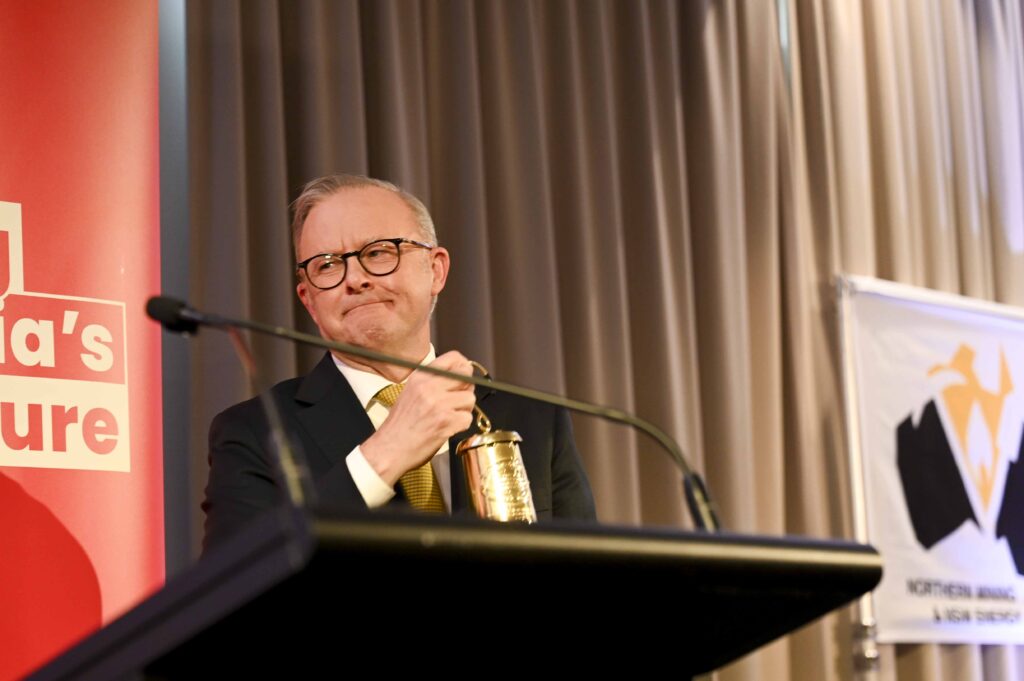April 3, 2025
Prime Minister Anthony Albanese had a message for MEU mining and energy workers gathering in Cessnock today: “Same Job Same Pay is making a difference to workers and communities all over Australia … on 3rd May its future is on the ballot paper.”
This message was reinforced when Peter Dutton said he would not repeal Same Job Same Pay laws but would ‘change’ them. After fighting Same Job Same Pay laws from the start, we reckon the Coalition would ‘change’ them out of existence.
Addressing our Northern Mining and NSW Energy District AGM, PM Albanese acknowledged the MEU’s role championing Same Job Same Pay laws, which were delivered by the Labor Federal Government in December 2023. These laws have already delivered substantial pay rises for 1500 labour hire coal miners, with thousands more in the pipeline.
He met MEU members who have personally benefited from Same Job Same Pay including Khynea and Adam from Mt Pleasant mine, who were converted from labour hire to permanent roles with a $30,000 pay rise after the MEU’s Same Job Same Pay application last May; and Levi and Iain from BHP’s Mt Arthur mine, who have converted from labour hire to permanent roles with BHP following a Same Job Same Pay order this year. Iain was labour hire at Mt Arthur for 11 years after finally gaining permanent employment once the wage-cutting labour hire loophole was closed.
Same Job Same Pay is also driving change in industries from aviation to retail and meat processing.
This week, a new report from the McKell Institute shows that the impact of the laws on wage uplift and community benefit are greater than expected.
Key findings of the report include:
- Same Job, Same Pay is projected to drive an annual wage uplift of up to $920.3 million.
- This wage uplift could deliver a broader economic contribution of up to $2.5 billion annually.
- In sectors like mining, aviation, and retail, workers are already seeing life-changing pay increases of $30,000–$60,000 per year.
- Some companies are proactively shifting labour hire workers into direct employment to comply with the new laws, ending a decade of outsourcing.
- Labour force data shows no negative employment effects from the changes. Instead, it shows rising employment, tight labour markets, and increased job satisfaction.
- Broader economic benefits are compounding, particularly in regions dependent on mining and manufacturing.
The report, Closing Loopholes, Opening Opportunities, highlights the experience in the mining industry where over 1,500 workers have received average pay increases of $33,500. A further 4,300 mining workers stand to benefit from pending decisions, worth an additional $200 million.
Prime Minister Albanese told MEU members the Labor Government was committed to lifting wages, reflected in growth in real wages five quarters in a row, saying “we know fair wages are not an obstacle to economic growth, they are fundamental to it.”
He contrasted Labor’s approach with Peter Dutton’s Liberal National Party, who have opposed tax cuts, promised cuts to services and committed to reversing pro-worker reforms.
MEU General President Tony Maher presented Prime Minister Albanese with a miners’ lamp, to acknowledge his introduction of the historic Same Job Same Pay reform.









